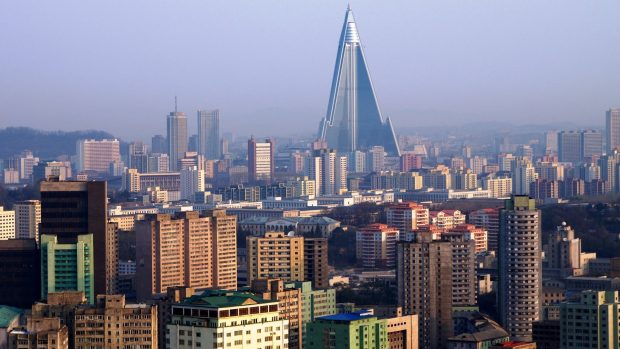
Lords of money, lords in offices
 Most first-time Western visitors to Pyongyang tend to come back somewhat surprised. They had expected to see the very embodiment of a Stalinist hell. Well, you know the picture: soldiers on every street corner sporting machineguns, ready to mow down the masses, pedestrians in colorless clothing slowly moving amidst mammoth, concrete shells of buildings. Instead, what they see is a city of reasonably well-attired residents, a booming restaurant culture, and a diverse array of major Western brands on sale, all purchased with relative ease (once you have the money, of course).
Most first-time Western visitors to Pyongyang tend to come back somewhat surprised. They had expected to see the very embodiment of a Stalinist hell. Well, you know the picture: soldiers on every street corner sporting machineguns, ready to mow down the masses, pedestrians in colorless clothing slowly moving amidst mammoth, concrete shells of buildings. Instead, what they see is a city of reasonably well-attired residents, a booming restaurant culture, and a diverse array of major Western brands on sale, all purchased with relative ease (once you have the money, of course).
Witnessing North Koreans enjoy fine dining while sporting Chanel handbags can be rather shocking. This often leads to the wrong conclusions: these people must all be “corrupt officials.” It follows that anyone with money is in bed with the regime or, at the very least, has enough access to siphon money from state coffers enabling an opulent lifestyle. There are seeds of truth in such assumptions, but to ascribe such a degree of corruption to all North Koreans, even those in Pyongyang is misleading and factually wrong.
While some North Koreans whom one may encounter in the capital of the revolution are indeed high-level officials who help themselves to the state budget or are good at extracting bribes, a much larger number belong to North Korea’s new rich, a new entrepreneurial class that rose from the devastation of the Arduous March in the 1990s. Since then, many businessmen and women have amassed significant fortunes.
Trade with China is their primary business activity, but many own restaurants and shops, operate mines, factories and fishing ships, and are even involved in transportation and logistics. Their activities (or most of them) are technically illegal, so they usually disguise their enterprises as state property, paying both bribes to officials and contributions to the state budget. But such legal niceties do not fool those in the know.
There is a new North Korean bourgeoisie whose economic wealth is growing fast. Indeed, the real estate market in Pyongyang has exploded over the last 10 years, with the price of a good apartment rising tenfold, from $5,000-$7,000 to $100,000 or more. Some private fortunes are now measured in millions of U.S. dollars.
But this raises an important question: How are the North Korean new rich (known as ‘”donju” in Korean, literally, “lords of money”) connected to the North Korean official class, the party apparatchiks?
In a recent conversation with one of these party officials, he said something I’ve heard many times before. He claimed, quite matter-of-factly, that “we are superior to them. These lords of money may be materially richer than us cadres, but at the end of the day, it is we who have the power.”
It is indeed telling that children of the new rich still aspire to be party officials rather than start businesses of their own.
This not a new phenomenon, and in fact reflects similar characteristics of many pre-modern and poorer societies. Imperial China might be a good example. In the days of the Ming and Qing dynasties, there was no shortage of hardworking business people, many of whom pioneered what at the time were revolutionary new technologies. However, when it came to educating their children, the rich Chinese of this long-gone era did not typically want their sons (daughters seldom counted back then) to continue the family business. They went to great lengths to ensure that the next generation would successfully pass the state exams in order to become high-ranking officials.
Private sector activity has great limitations under a powerful state that does not believe in the legitimacy and power of enterprise ― seeing it instead as merely a cow to milk (or to seek rent from). Historians have long studied the question of why China did not (or could not) revolutionize industry in the eighteenth and nineteenth centuries. Like North Korea today, many point to the inferior position of the business class. Some researchers of post-colonial societies in Latin America and Africa come to similar conclusions.
This is not to say that a diminished position will necessarily prevent private actors from significantly contributing to North Korea’s economic growth. However, technical innovation is not what drives the North Korea’s “donju,” and thus we should not expect a Northern equivalent of Silicon Valley to appear any time soon. The lack of formal legal protections or stable institutions for business is an extraordinary feature of contemporary North Korea. The new rich may be affluent with much economic clout, but the old-fashioned Stalinist apparatus is where the center of gravity still lies. (The Korea Times)


